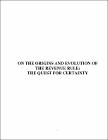| dc.description.abstract | The thesis advanced in this work is that the Revenue Rule, which stipulates that whilst forum courts may recognise a foreign tax law, they will not enforce it, does not meet the criteria of certainty. Uncertainties arise in relation to the origins, taxonomy and extent of the Rule, to what constitutes a revenue law, to the distinction between revenue and penal laws, to the supposed distinction between recognition and indirect enforcement of foreign revenue law and to what constitutes the rationale for the Rule.
The thesis begins with a modern statement of the Revenue Rule and a review, from a public international law perspective, of the nature and extent of a state?s power to tax.
Problems of classification are examined; in particular, the uncertainties surrounding what constitutes a revenue law and the appropriate classification, as between penal and revenue, of the criminal provisions that are invariably contained in taxation legislation.
The uncertainties attaching to the precise origin of the Revenue Rule are identified and a conceptual framework is developed and applied in analysing the early decisions relating to the Rule. The fundamental difficulties associated with the recognition/enforcement dichotomy are examined and an alternative classification is advanced.
The relationships between the act of state doctrine, the Revenue Rule and the doctrine of state or sovereign immunity, are considered, as are the uncertainties attaching to the taxonomy of the Rule. The hypothesis that the Revenue Rule constitutes a part of public, rather than private, international law is evaluated and the emerging confluence of these two areas of the law is noted.
In light of the assertion that, a departure from the Revenue Rule constitutes a derogation from sovereignty, the converse hypothesis, that in circumstances of constrained sovereignty departures from the Rule will be observable, is formulated and tested. Drawing on finance theory, this hypothesis is advanced in two forms; a strong form ? constrained sovereignty will result in a departure from the Revenue Rule, and; a weak form ? constrained sovereignty may result in a departure from the Rule.
The various justifications for the Revenue Rule are examined, including the contention that the self-interest of the forum provides the most compelling rationale for the existence and persistence of the Rule.
The development of the doctrine of functional enforcement, in the United States, is examined and the possibility of a trans-Atlantic divide, given recent UK and European Court of Justice decisions, is considered. The degree to which it is possible to avoid the Revenue Rule, by seeking in personam and in rem remedies, is explored, and a new category, ad informandum, is proposed.
The uncertainties relating to the extent to which the courts are willing to modify the operation of the Revenue Rule to protect the interests of fiduciaries is considered and the evolving application of the Rule, in the context of transnational insolvencies, is examined. The thesis concludes that, notwithstanding the uncertainties that surround it, for as long as it is perceived to serve the interests of the forum, and absent legislative intervention, the Revenue Rule is likely to continue to prosper. | en |




